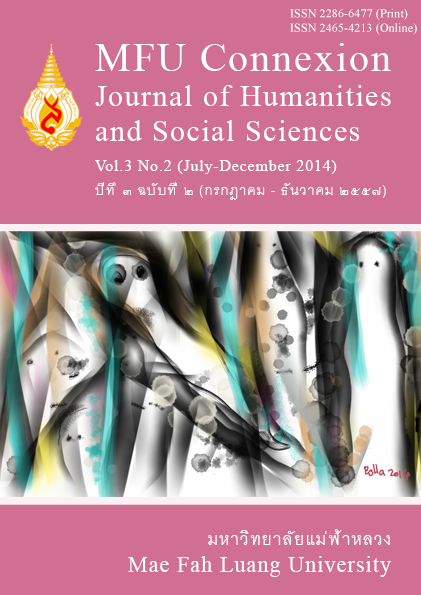รูปแบบการควบคุมทางสังคมเพื่อการเลิกสูบบุหรี่: การบูรณาการความร่วมมือระหว่างเครือข่ายชุมชนกับระบบการบริการสุขภาพ ของรัฐระดับชุมชน
Main Article Content
Abstract
This research explores various methods that volunteer participants employed to control, reduce and quit smoking. The procedure was to formulate the patterns and processes necessary to help smokers quit smoking.
The sample population was drawn from 331 volunteers in Srikham Sub-district, Mae Chan District, Chiang Rai Province who wished to quit smoking. The research methodology employed was the Participatory Action Research and Social Controlling Processes (Intervention) between health promoting volunteers and the sample population.
The research revealed that the social controlling processes, which involved reeducating smokers about the negative impacts of smoking and the close monitoring by volunteers by a 1 to 3 ratio (1 volunteer monitor to 3 smokers) led to behavioral transformation. 33 smokers (10%) were successful in quitting and 148 (44.7%) are still smoking but they have managed to reduce their number of cigarettes. However, 150 (45.3%) participants did not have any significant behavioral transformation. Those who have successfully quit smoking have expressed that they have gained significant self confidence and are recognized and embraced by their families. It appears that everyone is pleased with the successful campaign for reducing smoking and for the ability of some to permanently quit smoking.
Article Details
Copyright
Connexion: Journal of Humanities and Social Sciences has an exclusive right to publish the accepted articles in any form. However, the author retains the following rights:
1. The right to the ownership of the article;
2. The right to use all or part of the article in his/her other works;
3. The right to re-produce the article for personal use or for use in the author’s organisation, in which case the author must obtain permission from Connexion: Journal of Humanities and Social Sciences;
4. The right to make copies of all or part of the work for educational use or for the author’s use in classroom teaching; and
5. The right to include the work (both the preprinted and printed versions) in an institutional repository.
References
ชมนาด วรรณพรศิริ. (2535) ความสัมพันธ์ระหว่างเครือข่ายทางสังคม การสนับสนุนทางสังคมและสุขภาพจิตของพยาบาล โรงพยาบาลพุทธชินราช จังหวัดพิษณุโลก, วิทยานิพนธ์พยาบาลศาสตรมหาบัณฑิต สาขาการพยาบาลอายุรศาสตร์และศัลยศาสตร์, มหาวิทยาลัยเชียงใหม่, เชียงใหม่.
สังคมวิทยา การจัดระเบียบทางสังคม. (2543) จาก https://www.baanjomyut.com/library/social_sciences/17.htmlg [ค้นเมื่อ 11 กันยายน 2556]
Cobb, S. (1976) Social support a moderate of life stress, Psychosomatic Medicine, vol. 38, no. 5, pp. 300-314.
Pender, N.J. (1996) Health promotion in nursing practice, 2nd edition, Norwalk: Appleton&Lange.
Schaefer, C., Coyne, J.C., & Lasarus, R.S. (1981) The health related functions of social support, Journal of Behavioral Medicine, vol. 4, pp. 381-406.


